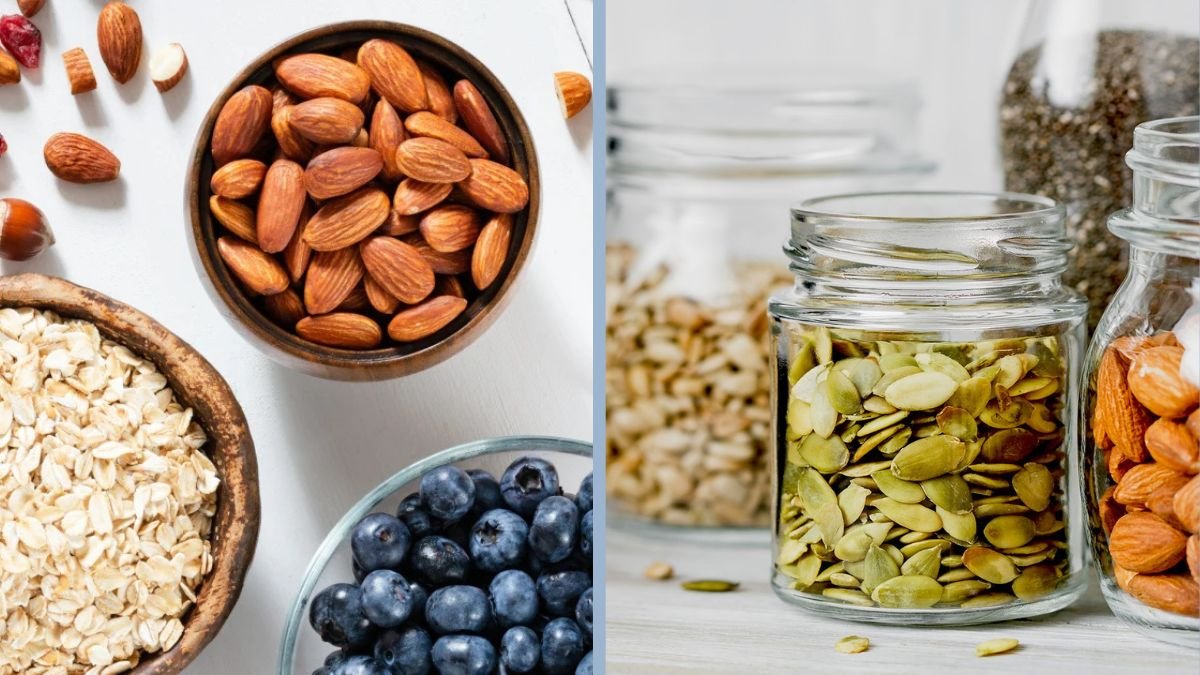In modern life, balancing work, family, and personal commitments often leaves little time for elaborate meal preparation. Busy weeknights demand meals that are both convenient and nutritious. Stocking a pantry with nutrient-dense, versatile ingredients can transform rushed cooking into an opportunity for healthy, satisfying meals. Nutrient-dense pantry items provide essential vitamins, minerals, protein, and fiber, supporting overall health and sustained energy while simplifying meal planning.
This article explores the top five nutrient-dense pantry staples every kitchen should include, highlighting their nutritional benefits, versatility, and practical applications for quick weeknight meals. All items are plant-based, easy to store, and adaptable to various dietary preferences.
1. Canned or Dried Legumes
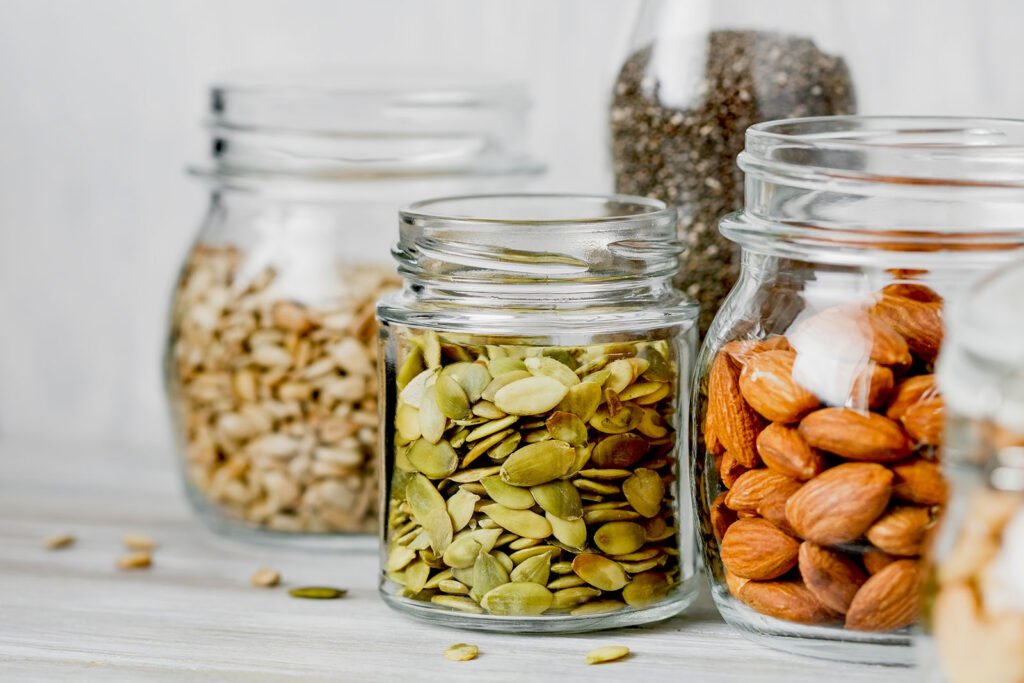
Examples: Lentils, chickpeas, black beans, kidney beans
Nutritional Benefits:
Legumes are a cornerstone of plant-based nutrition, providing high-quality protein, complex carbohydrates, fiber, and essential minerals such as iron, magnesium, and folate. For instance, one cup of cooked lentils contains approximately 18 grams of protein and 16 grams of fiber, supporting satiety and digestive health.
Practical Uses for Busy Weeknights:
- Stir-Fries: Toss cooked lentils or chickpeas with sautéed vegetables and spices for a quick, protein-rich meal.
- Salads: Combine canned beans with greens, olive oil, and lemon juice for a nutrient-packed salad.
- Soups and Stews: Add canned or pre-cooked legumes to broths and simmer for 15–20 minutes for a comforting, hearty dish.
- Wraps and Tacos: Mash black beans with spices for a filling taco or wrap.
Tips for Efficiency:
- Keep both canned and dried options on hand; canned beans save time, while dried beans are cost-effective for batch cooking.
- Rinse canned beans to reduce sodium content.
- Cook dried beans in bulk and freeze portions for quick access.
2. Whole Grains
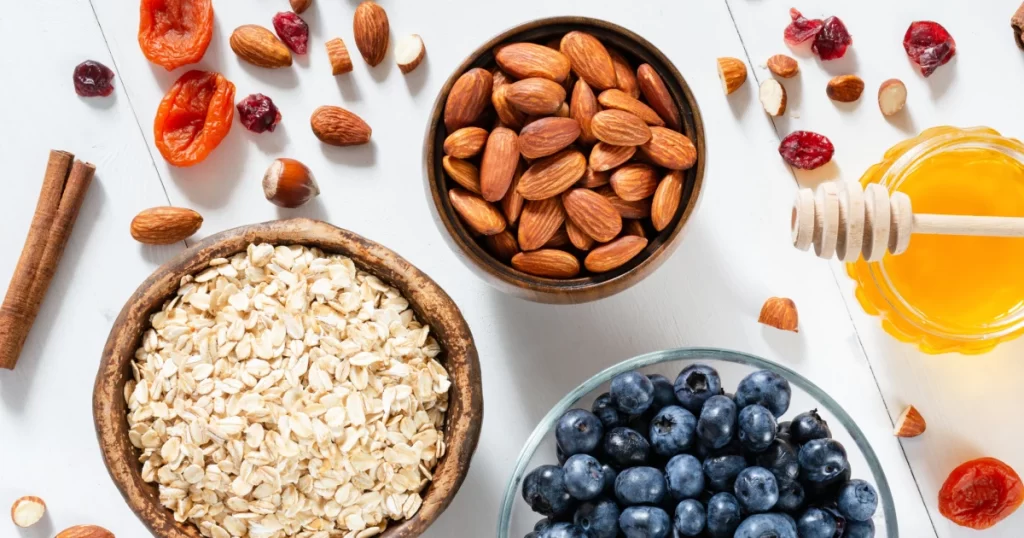
Examples: Brown rice, quinoa, farro, barley, rolled oats
Nutritional Benefits:
Whole grains are rich in complex carbohydrates, fiber, B vitamins, minerals, and plant-based protein. Quinoa, a complete protein, contains all nine essential amino acids, making it an excellent option for vegetarian diets. Whole grains also stabilize blood sugar, support digestive health, and provide sustained energy throughout the evening.
Practical Uses for Busy Weeknights:
- Grain Bowls: Combine cooked grains with roasted vegetables, beans, and a flavorful dressing for a balanced meal.
- Stir-Fries: Use cooked brown rice or farro as a base for vegetable and tofu stir-fries.
- Breakfast-for-Dinner: Prepare oatmeal topped with nuts, seeds, and fruits for a nutrient-rich, comforting evening meal.
- Casseroles: Use grains as a base in layered vegetable casseroles for easy reheating.
Tips for Efficiency:
- Pre-cook grains and store them in airtight containers for several days.
- Use quick-cooking options like quinoa or bulgur for rapid meal preparation.
- Experiment with frozen or pre-cooked grain blends to reduce cooking time.
3. Canned Tomatoes and Tomato Paste
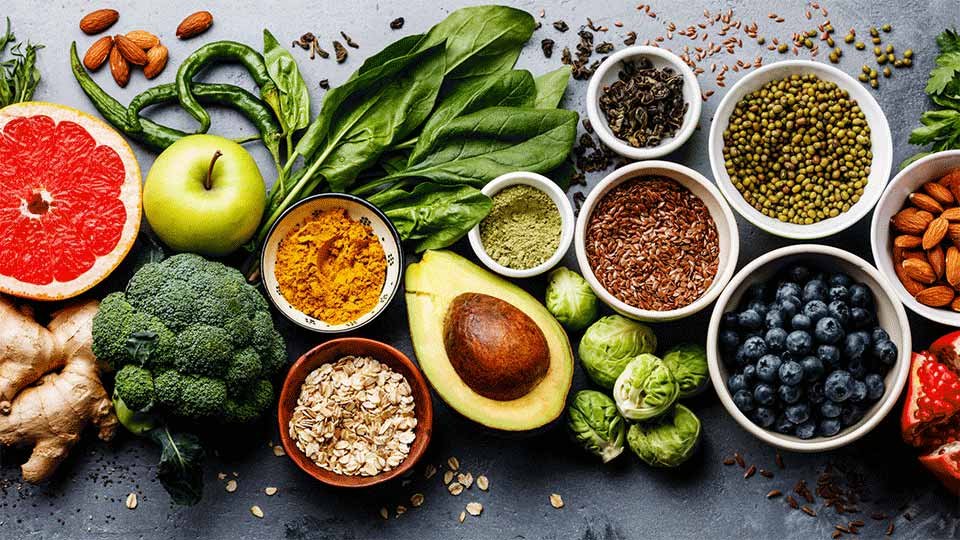
Nutritional Benefits:
Tomatoes are a rich source of vitamins A and C, potassium, folate, and antioxidants such as lycopene, which supports cardiovascular health and reduces inflammation. Canned tomatoes and tomato paste are convenient ways to add nutrient density and flavor to meals with minimal preparation.
Practical Uses for Busy Weeknights:
- Pasta Sauces: Simmer canned tomatoes with garlic, onions, and herbs for a quick, nutrient-rich sauce.
- Soups and Stews: Add tomato paste to vegetable soups and stews for depth of flavor and increased antioxidant content.
- Curries: Incorporate tomatoes in chickpea or lentil curries for a vitamin-rich base.
- Shakshuka-Inspired Dishes: Simmer tomatoes with spices and sautéed vegetables for a hearty, plant-based alternative.
Tips for Efficiency:
- Use diced, crushed, or pureed canned tomatoes depending on recipe needs.
- Store opened cans in an airtight container in the refrigerator for up to a week.
- Enhance flavor with fresh or dried herbs like basil, oregano, and thyme.
4. Nuts and Seeds
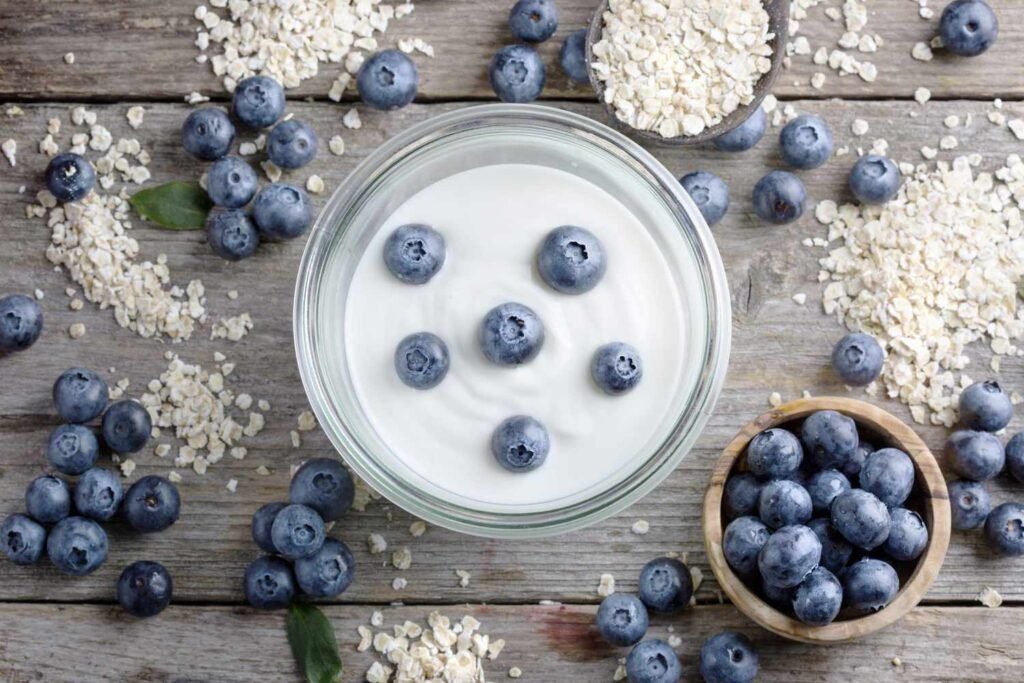
Examples: Almonds, walnuts, cashews, sunflower seeds, chia seeds, flaxseeds
Nutritional Benefits:
Nuts and seeds are rich in plant-based protein, healthy fats, fiber, vitamins, and minerals such as magnesium, zinc, and vitamin E. They support cardiovascular health, cognitive function, and satiety, making them an excellent addition to quick meals or snacks.
Practical Uses for Busy Weeknights:
- Salads and Grain Bowls: Sprinkle nuts or seeds over bowls for added texture and protein.
- Sauces and Dressings: Blend cashews into creamy, plant-based sauces for pasta or vegetable dishes.
- Snacks: Roast almonds or mix seeds with dried fruits for portable, nutrient-dense snacks.
- Baking: Add seeds and nuts to muffins, breads, or protein bars for quick, wholesome desserts.
Tips for Efficiency:
- Pre-roast or toast nuts and seeds to enhance flavor and keep them on hand for rapid use.
- Store in airtight containers to prevent rancidity.
- Mix seeds into yogurt, porridge, or smoothies for instant protein and micronutrients.
5. Frozen Vegetables
Examples: Broccoli, spinach, peas, mixed vegetable medleys
Nutritional Benefits:
Frozen vegetables retain most of their nutrients and provide fiber, vitamins, and minerals essential for health. They are especially useful for weeknight meals because they are pre-washed, pre-chopped, and ready to cook, saving time without compromising nutritional value.
Practical Uses for Busy Weeknights:
- Stir-Fries: Quickly sauté frozen vegetables with garlic, soy sauce, or other seasonings.
- Soups and Curries: Add frozen vegetables directly to soups, curries, or chili for instant bulk and nutrition.
- Pasta Dishes: Incorporate frozen peas, spinach, or broccoli into pasta sauces or casseroles.
- Smoothies: Use spinach or kale in blended smoothies for a nutrient boost.
Tips for Efficiency:
- Keep a variety of vegetables on hand to rotate flavors and textures.
- Steam or sauté frozen vegetables without thawing to retain texture and nutrients.
- Mix frozen vegetables with grains or legumes for complete, balanced meals.
Practical Tips for a Nutrient-Dense Pantry
- Plan for Versatility: Choose pantry staples that can be used in multiple meals.
- Prioritize Shelf Life: Stock long-lasting ingredients like legumes, canned tomatoes, nuts, seeds, and grains for convenience.
- Pre-Cook When Possible: Cook grains or legumes in batches to save time during busy nights.
- Incorporate Fresh or Frozen Produce: Combine pantry items with fresh or frozen vegetables to maximize nutrients.
- Use Herbs and Spices: Enhance flavor without added calories or sodium.
Health Benefits and Functional Properties
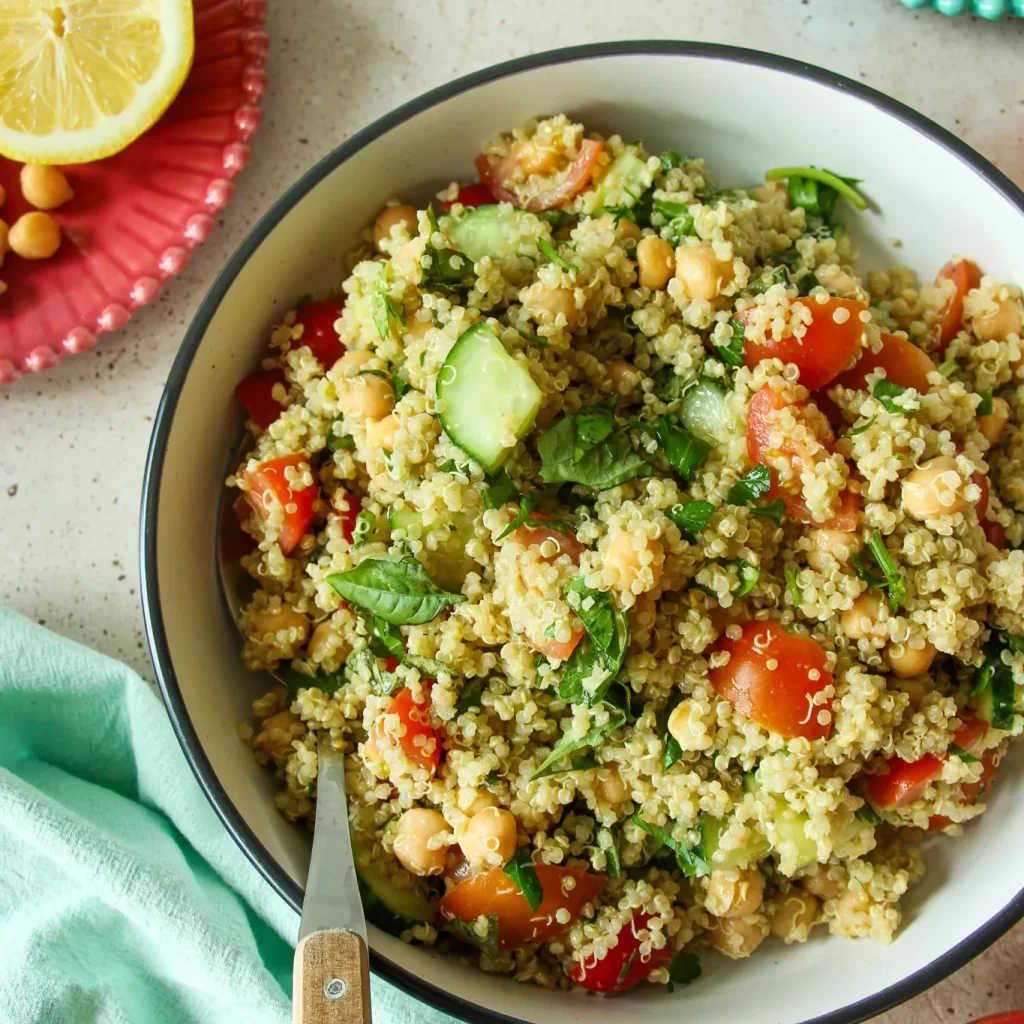
Stocking a nutrient-dense pantry supports several aspects of health:
- Balanced Nutrition: Combining legumes, grains, nuts, and vegetables ensures adequate intake of protein, fiber, healthy fats, and micronutrients.
- Sustained Energy: Complex carbohydrates from whole grains and legumes maintain blood sugar levels and prevent energy crashes.
- Digestive Health: Fiber from legumes, whole grains, and vegetables supports gut health and satiety.
- Cardiovascular Support: Nuts, seeds, and tomatoes provide heart-healthy fats, antioxidants, and anti-inflammatory compounds.
- Convenience Without Compromise: Nutrient-dense pantry items enable quick, wholesome meals without sacrificing quality.
Environmental and Dietary Considerations
Plant-based pantry staples offer sustainability advantages:
- Reduced Carbon Footprint: Minimizing reliance on animal products reduces environmental impact.
- Minimal Processing: Dry grains, canned legumes, and frozen vegetables maintain nutrient density while reducing packaging waste.
- Seasonal and Local Options: Supporting local grain, legume, and vegetable producers reduces transportation emissions.
- Long Shelf Life: Pantry staples minimize food waste while ensuring nutritional availability.
Conclusion
A well-stocked pantry is the cornerstone of efficient, healthy weeknight cooking. Nutrient-dense staples such as legumes, whole grains, canned tomatoes, nuts and seeds, and frozen vegetables provide essential protein, fiber, vitamins, minerals, and healthy fats. These versatile ingredients enable the preparation of balanced, satisfying meals in minimal time, supporting overall health and wellness.
By combining these pantry items creatively, busy weeknights can become opportunities for nutritious, flavorful meals that satisfy both the palate and the body. Incorporating these staples into a plant-forward diet ensures consistent nutrient intake, simplifies meal planning, and promotes sustainable, health-conscious eating habits.
With thoughtful stocking, batch preparation, and creative combinations, a nutrient-dense pantry empowers individuals to meet their dietary needs efficiently while enjoying diverse, plant-based meals every weeknight.
